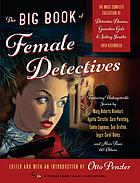
The Big Book of Female Detectives
کتاب های مرتبط
- اطلاعات
- نقد و بررسی
- دیدگاه کاربران
نقد و بررسی

August 1, 2018
Most of the bulked-up anthologies veteran editor Penzler has produced for Black Lizard (The Big Book of Rogues and Villains, 2017, etc.) are remarkable mainly for their comprehensiveness, even their exhaustiveness. Not this one.Most of the 74 stories Penzler has chosen are beyond cavil. The first 10 entries, originally published between 1864 and 1911, may not set your pulse racing, but they're historically indispensable, and the tales by L.T. Meade and Robert Eustace, Baroness Emmuska Orczy, and Richard Marsh will set many readers to searching for more stories featuring Florence Cusack, Lady Molly Robertson-Kirk, and Judith Lee. Nor is anyone likely to quarrel with the reprints from the first half of the 20th century, from Carolyn Wells, Anna Katharine Green, Mary Roberts Rinehart, F. Tennyson Jesse, and Mignon G. Eberhart to Phyllis Bentley, Gladys Mitchell, Frederick Nebel, and Richard Sale. H.H. Holmes supplies an adventure of Sister Ursula, Stuart Palmer presents the spinster schoolteacher Hildegarde Withers, and James Yaffe showcases the anonymous mother of the police detective who narrates her armchair-and-coffee table investigations. Trouble arrives only later on, when the field becomes too rich to do more than sample. Following a gap of more than 20 years (1966-1989) that evidently produced no worthwhile short stories featuring female sleuths, Penzler resumes with tales by Marcia Muller, Sue Grafton, Carolyn Hart, Faye Kellerman, Sara Paretsky, Nevada Barr, Linda Barnes, S.J. Rozan, Laura Lippman, Wendy Hornsby, and eight others. But fans will search in vain for anything by such equally eminent candidates as Sharyn McCrumb, Barbara D'Amato, Margaret Maron, Val McDermid, Kathy Reichs, Liza Cody, Denise Mina, Laurie R. King, Rhys Bowen, Karin Slaughter, Kerry Greenwood, or Alan Bradley. The only way for Penzler to have shoehorned them into his 1,100-plus pages would have been to cut the last section, "Bad Girls," whose dozen selections (including two more by Meade and Eustace and one by Penzler's adored Joyce Carol Oates) seem to have wandered in from a different collection, or to replace The Secret Adversary, the second-rate 1922 novel in which Agatha Christie introduced the forgettable Tommy and Tuppence, with a short story featuring Miss Marple, who together with Nancy Drew is the most notable no-show here.On balance, then: lots of landmarks, even more incidental pleasures, and endless provocations for arguments about who really should have made the cut.
COPYRIGHT(2018) Kirkus Reviews, ALL RIGHTS RESERVED.

August 13, 2018
Penzler’s entertaining eighth Big Book (after 2017’s The Big Book of Rogues and Villains) spans 150 years and assembles 74 stories featuring female sleuths from both sides of the Atlantic. The anthology carries bloat—several women are but ancillary characters, and a section highlighting “bad girls” seems thematically incongruous—but it also packs plenty of substance. Charlotte Armstrong’s “Meredith’s Murder” and Phyllis Bentley’s “The Missing Character” illustrate the shrewdness of adolescents and elderly ladies, respectively. Mary Roberts Rinehart’s “Locked Doors” makes a strong case for nurse detectives. Agatha Christie’s “The Secret Adversary” firmly establishes the coequality of investigative duo Tommy and Tuppence. Mignon G. Eberhart’s “Introducing Susan Dare” proves that manor-house mysteries can have high stakes and a ticking clock. Sara Paretsky tackles homophobia with “Strung Out”; Nevada Barr’s “Beneath the Lilacs” argues for the subjective morality of murder”; and in Marcia Muller’s “All the Lonely People,” Sharon McCone—the first fictional female PI written by a woman—pillories dating culture while baiting a thief. This is an essential volume for crime lovers of all genders.

























دیدگاه کاربران